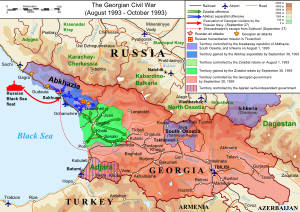24-11-17 Caucasus Mountains - FactSpark > .
24-8-13 Georgia Has Been Invaded Many Times - Geoff > .23-9-29 Nagorno-Karabakh | Ethnic Cleansing? - J K-L > .22-10-15 Why Azerbaijan Will Keep Attacking Armenia - Real > .
"Eastern Europe"
Caucasus - Armenia, Azerbaijan, Georgia - Graydations >> .
The Caucasus, or Caucasia, is a region [lying between Russia and the Middle East] between the Black Sea and the Caspian Sea and mainly occupied by Armenia, Azerbaijan, Georgia, and parts of Southern Russia. It is home to the Caucasus Mountains, including the Greater Caucasus mountain range, which has historically been considered a natural barrier between Eastern Europe and Western Asia.
(Georgia, Armenia, and Azerbaijan - Russia's autonomous mountainous southern rampart.)
Europe's highest mountain, Mount Elbrus, at 5,642 metres (18,510 ft) is in the west part of the Greater Caucasus mountain range. On the southern side, the Lesser Caucasus includes the Javakheti Plateau and grows into the Armenian highlands, part of which is located in Turkey.
The Caucasus region is separated into two parts, which fall into two continents, the North Caucasus of Russia (Ciscaucasia) in Europe, and the South Caucasus (Transcaucasia) in Asia, respectively. The Greater Caucasus mountain range in the north is mostly shared by Russia and Georgia, as well as the northernmost parts of Azerbaijan. The Lesser Caucasus mountain range in the south is occupied by several independent states, namely, mostly by Armenia, Azerbaijan, and Georgia, but also extending to parts of northeastern Turkey, northern Iran and the partially recognised Artsakh Republic.
 The region is known for its linguistic diversity: aside from Indo-European and Turkic languages, the Kartvelian, Northwest Caucasian, and Northeast Caucasian language families are indigenous to the area.
The region is known for its linguistic diversity: aside from Indo-European and Turkic languages, the Kartvelian, Northwest Caucasian, and Northeast Caucasian language families are indigenous to the area.Up to and including the early 19th century, the Southern Caucasus and southern Dagestan all formed part of the Persian Empire. In 1813 and 1828 by the Treaty of Gulistan and the Treaty of Turkmenchay respectively, the Persians were forced to irrevocably cede the Southern Caucasus and Dagestan to Imperial Russia. In the ensuing years after these gains, the Russians took the remaining part of the Southern Caucasus, comprising western Georgia, through several wars from the Ottoman Empire.
In the second half of the 19th century, the Russian Empire also conquered the Northern Caucasus. In the aftermath of the Caucasian Wars, an ethnic cleansing of Circassians was performed by Russia in which the indigenous peoples of this region, mostly Circassians, were expelled from their homeland and forced to move primarily to the Ottoman Empire.
Having killed and deported most of Armenians of Western Armenia during the Armenian Genocide, the Turks intended to eliminate the Armenian population of Eastern Armenia. During the 1920 Turkish–Armenian War, 60,000 to 98,000 Armenian civilians were estimated to have been killed by the Turkish army. In the 1940s, around 480,000 Chechens and Ingush, 120,000 Karachay–Balkars and Meskhetian Turks, thousands of Kalmyks, and 200,000 Kurds in Nakchivan and Caucasus Germans were deported en masse to Central Asia and Siberia. About a quarter of them died.
The Southern Caucasus region was unified as a single political entity twice – during the Russian Civil War (Transcaucasian Democratic Federative Republic) from 9 April 1918 to 26 May 1918, and under the Soviet rule (Transcaucasian SFSR) from 12 March 1922 to 5 December 1936. Following the dissolution of the Soviet Union in 1991, Georgia, Azerbaijan and Armenia became independent nations.The region has been subject to various territorial disputes since the collapse of the Soviet Union, leading to the First Nagorno-Karabakh War (1988–1994), the East Prigorodny Conflict (1989–1991), the War in Abkhazia (1992–93), the First Chechen War (1994–1996), the Second Chechen War (1999–2009), and the 2008 South Ossetia War.
On 27 September 2020, new clashes in the unresolved Nagorno-Karabakh conflict resumed along the Nagorno-Karabakh Line of Contact. Both the armed forces of Armenia and Azerbaijan reported military and civilian casualties. The Nagorno-Karabakh ceasefire agreement to end the six-week war between Armenia and Azerbaijan was seen by many as Armenia's defeat and capitulation.In the second half of the 19th century, the Russian Empire also conquered the Northern Caucasus. In the aftermath of the Caucasian Wars, an ethnic cleansing of Circassians was performed by Russia in which the indigenous peoples of this region, mostly Circassians, were expelled from their homeland and forced to move primarily to the Ottoman Empire.
Having killed and deported most of Armenians of Western Armenia during the Armenian Genocide, the Turks intended to eliminate the Armenian population of Eastern Armenia. During the 1920 Turkish–Armenian War, 60,000 to 98,000 Armenian civilians were estimated to have been killed by the Turkish army. In the 1940s, around 480,000 Chechens and Ingush, 120,000 Karachay–Balkars and Meskhetian Turks, thousands of Kalmyks, and 200,000 Kurds in Nakchivan and Caucasus Germans were deported en masse to Central Asia and Siberia. About a quarter of them died.
Ruscism ..




No comments:
Post a Comment
Note: Only a member of this blog may post a comment.